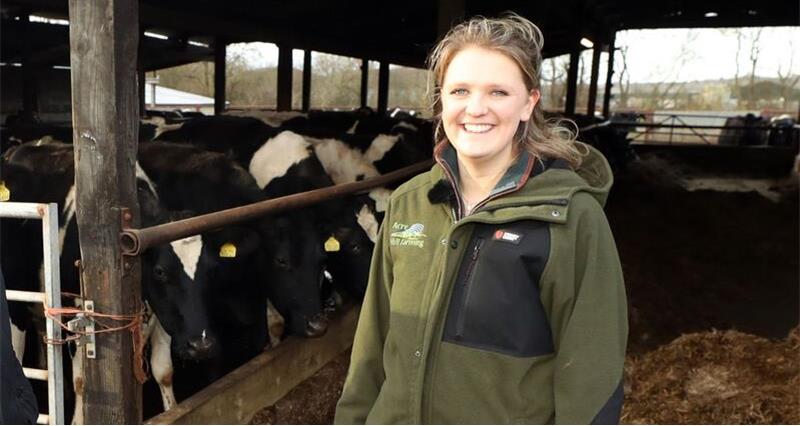IŌĆÖm Amy Eggleston, a 27-year-old farmer from Leicestershire and a recent appointee to the NFU Dairy Board. Alongside my family, I help to manage our 600-cow spring calving, grazing unit.
After the completion of my university degree, I spent time working in PR, social media and marketing with brands such as Microsoft and TGI Fridays.
Although I grew up on the farm and it was something I had experienced from a young age, it wasnŌĆÖt my natural next step after university. I enjoyed living in a city and wanted to learn more about how brands communicate with customers.
Leaving city life behind in 2018 due to an injury, I decided to come home to join the family business and spent time learning about the practical aspects of the job and the wider industry. Alongside this, I launched my own marketing business, Pastures Green Communications, striving to help agricultural businesses connect with customers, with a strong focus on social media.
At this time, I also set up my own social media account for the farm, aiming to positively promote the dairy farming life using the alias @thedairydaughter on Instagram.
ŌĆ£My friends back in Leeds and London really had no idea what farming entailed, or where their food came from. They encouraged me to share my ŌĆśnormalŌĆÖ day ŌĆō which was worlds away from anything they had ever seen!ŌĆØ
Growing your followers
After sharing an insight into my farming (and personal!) life almost every day for a year, we now have 20,000 people following the farming account. It has also enabled me to make many important connections and answer consumer questions along the way.
I really believe that the importance of social media for our industry cannot be underestimated ŌĆō especially as it is a free, simple tool we can use to show people how food is made in the UK. Yes, we should use it with caution, but really, I have found it is a great way to show a true, accurate representation of a working British dairy farm.
My six top tips for social media
Keep it simple
As farmers we are often guilty of using jargon and abbreviations that wonŌĆÖt mean anything to most people. Keeping it simple means explaining words like ŌĆśheifersŌĆÖ and ŌĆśslurryŌĆÖ to avoid miscommunication.
Share wisely
Be careful about what you put online. Photos and videos we share might only show on our page for 24 hours, but in a digital world, everything can be recorded and kept indefinitely. Whilst, in reality, your photo might be harmless and easy to explain, it is not worth sharing something which could compromise the reputation of the industry. If youŌĆÖre unsure, donŌĆÖt share.
Have fun with it!
Encourage people to ask you questions and share the answers. It might be something as simple as ŌĆśhow do you milk a cow?ŌĆÖ, but your accurate account of how it actually happens could completely change a perspective.
Find facts
╗╩╝ę╗¬╚╦has so many resources you can use (like the myth buster). Be sure to share factual information rather than speculating ŌĆō especially if youŌĆÖre comparing to dairy alternatives or other industries.
Remember consumer priorities
What do people want to know and see? Animal welfare and the environment are two popular topics, so be sure to show how much we do as an industry to care for our animals every single day as well as caring for the surrounding landscape.
Sharing
Focus on sharing positive, accurate messages.
Unfortunately, sharing online may attract some negative comments and you may receive messages from people who disagree with our industry. Having received comments like this myself I would say to ignore and use the block button where needed.
Our Rethinking Ruminants Member Toolkit has plenty of stats, infographics and resources to help promote the UK livestock sectors online.╠²
╠²
╠²
